Geoffrey Gudgion's Blog, page 6
May 17, 2014
Sarah Potter Writes
Sarah Potter kindly interviewed me on her site Sarah Potter Writes
Interview with Author Geoffrey Gudgion.
Filed under: One writer's journey

May 5, 2014
Catherine Bonnevaux
 Historical Novelist Carol McGrath kindly tagged me in her blog last week, and asked me what I’m working on. Carol, by way of reciprocal introduction, writes wonderful novels about the royal women of King Harold’s court in the years before and after the Norman conquest. Her book ‘The Handfasted Wife’ was a finalist for this year’s Romance Novelist Association’s historical award. Click the icon for more details.
Historical Novelist Carol McGrath kindly tagged me in her blog last week, and asked me what I’m working on. Carol, by way of reciprocal introduction, writes wonderful novels about the royal women of King Harold’s court in the years before and after the Norman conquest. Her book ‘The Handfasted Wife’ was a finalist for this year’s Romance Novelist Association’s historical award. Click the icon for more details.
Carol asked me several questions:
What am I working on?
I’m at the final draft and editing phase of Catherine Bonnevaux, a thriller with a supernatural twist. When newly affluent businessman Paul Devlin and his girlfriend Fiona buy a barn conversion near Halstead Hall, the ancestral home of the Bonnevaux family, they think they’re buying a rural idyll. They are met by a wall of resentment, and are drawn into a conflict that has its roots in Dark Age, pagan times. There’s an overview under ‘Current Projects’.
What inspired you to write this?
Two years ago my wife and I visited the lovely Haddon Hall in Derbyshire, which dates from the 12th to the 17th centuries. In the valley below there are traces of the ‘lost village’ of Nether Haddon, visible now only in ridge-and-furrow field patterns, tracks that are just patterns in pasture, and some exquisite wall paintings in Haddon Hall’s chapel. No-one knows for sure why the village disappeared, some time around the 14th century.
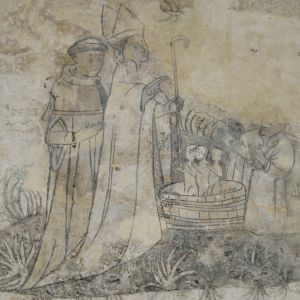 Those wall paintings made the lost village seem more human. History is always written about the great families, the Vernons and the Manners of Haddon, but what about the peasant kneeling in the grass? What story might he tell?
Those wall paintings made the lost village seem more human. History is always written about the great families, the Vernons and the Manners of Haddon, but what about the peasant kneeling in the grass? What story might he tell?
So I had the idea of a rural dynasty that was born, over six hundred years ago, with a terrible oath that bound the Bonnevaux family to the soil and people of Halgestede, the ‘Holy Place’. In the present day, the Halstead estate is crumbling and the oath has been forgotten by the Bonnevaux but not, it seems, by the families that have served them for centuries. Families that might, perhaps, have inspired Rudyard Kipling’s poem The Land:
His dead are in the churchyard – thirty generations laid.
Their names were old in history when Domesday Book was made.
And the passion and the piety and prowess of his line
Have seeded, rooted, fruited in some land the Law calls mine.
What’s your writing process?
I’m not sure I’ve defined it yet. It involves a lot of staring into space, inhabiting the world I’m trying to create. In the summer I write in an arbour I built in the garden, where I’m most productive. In the winter I replicate that as much as possible in my study by playing background ‘music’ of birdsong. As I come close to finishing a book I become very focused and tend to ignore all other tasks. Bills, jobs, even friends. At the beginning of a project it’s like wading out into a river, slow and sticky. Then the current takes you and nothing else matters.
Carol: Who would you like to introduce?
 Dave Weaver‘s writing ranges from YA fantasy to literary fiction. He is married to a Japanese lady, and his fascination with Japan has produced some stunning work. He describes his love for the ‘beautiful colours of its landscapes and the subtlety of its culture, for its contradictions and certainties, intelligence and passion, spirit and diversity. Yet beneath all these things lies another Japan; one of ghosts and shadows, unspoken secrets, demons from the past and uncertain visions of the future. It’s what makes this intriguing country ultimately unknowable, unique, Nippon…
Dave Weaver‘s writing ranges from YA fantasy to literary fiction. He is married to a Japanese lady, and his fascination with Japan has produced some stunning work. He describes his love for the ‘beautiful colours of its landscapes and the subtlety of its culture, for its contradictions and certainties, intelligence and passion, spirit and diversity. Yet beneath all these things lies another Japan; one of ghosts and shadows, unspoken secrets, demons from the past and uncertain visions of the future. It’s what makes this intriguing country ultimately unknowable, unique, Nippon…
Dave will blog next week at http://daveweaver-unreal.blogspot.co.uk/
 Libby McGugan and I share the same publisher, Solaris. Her fast-paced, intelligent novel ‘The Eidolon’ came out just after Saxon’s Bane. Libby grew up with an ambition to join the Rebel Alliance in a Galaxy Far, Far away, or get a job in film production (it was a tough choice). Instead she studied medicine and worked as an emergency physician. A travel junkie, she’s been trekking in the Himalaya of Bhutan, inter-railing round Europe and backpacking in Chile, USA and Borneo. She plays the fiddle and loves TED talks. Her biggest influence was probably Yoda. Libby will blog next week at http://libbymcgugan.com
Libby McGugan and I share the same publisher, Solaris. Her fast-paced, intelligent novel ‘The Eidolon’ came out just after Saxon’s Bane. Libby grew up with an ambition to join the Rebel Alliance in a Galaxy Far, Far away, or get a job in film production (it was a tough choice). Instead she studied medicine and worked as an emergency physician. A travel junkie, she’s been trekking in the Himalaya of Bhutan, inter-railing round Europe and backpacking in Chile, USA and Borneo. She plays the fiddle and loves TED talks. Her biggest influence was probably Yoda. Libby will blog next week at http://libbymcgugan.com
 Toby Frost always wanted to be an astronaut, but somehow reality got in the way. He trained to be a barrister, but decided to follow a career writing about spaceships instead. He is the author of four comedy novels, published by Myrmidon books, about the misadventures of British space captain Isambard Smith and his somewhat dysfunctional crew as they travel the galaxy conquering space and making tea. In 2013, his science fiction novel Straken was published by Black Library. The fifth Space Captain Smith novel, End of Empires, is due out in August 2014. Toby’s website, which contains details about the books along with other content, is at: www.toby.frost.com.”
Toby Frost always wanted to be an astronaut, but somehow reality got in the way. He trained to be a barrister, but decided to follow a career writing about spaceships instead. He is the author of four comedy novels, published by Myrmidon books, about the misadventures of British space captain Isambard Smith and his somewhat dysfunctional crew as they travel the galaxy conquering space and making tea. In 2013, his science fiction novel Straken was published by Black Library. The fifth Space Captain Smith novel, End of Empires, is due out in August 2014. Toby’s website, which contains details about the books along with other content, is at: www.toby.frost.com.”
Filed under: One writer's journey Tagged: books, debut novel, Genre, literature, publication, publishing, Saxon's Bane, solaris books, writing

November 6, 2013
A short story for Remembrance
 My father had excellent care in the final months of his life, but as I watched the nursing staff, I saw that their care was wrapped in the instinctive condescension of youth towards age; the louder tones that assumed deafness, and the same, mildly patronising manner that an adult might use with a petulant, dull-witted infant. One such interaction started me thinking about what my father had been doing when he was the age of his carers.
My father had excellent care in the final months of his life, but as I watched the nursing staff, I saw that their care was wrapped in the instinctive condescension of youth towards age; the louder tones that assumed deafness, and the same, mildly patronising manner that an adult might use with a petulant, dull-witted infant. One such interaction started me thinking about what my father had been doing when he was the age of his carers.
The ‘Arthur’ of this story is not my father. Dad’s war was in Africa rather than Korea, but as I watched the nurse leave the room that day, I thought ‘Dear God, if only you knew…’
SHORT BURSTS
“ART’AR?”
The legs standing beside Arthur were clad in blue, uniform slacks above a feminine pair of ankles. They disrupted his thoughts the way the dawn chorus interrupts a nightmare.
“Wha’ are you doing down there, Art’ar?” She spoke in a sing-song, Oriental accent, surprise lifting her voice. Arthur twisted in his corner, trapped in a foetal crouch between sensible shoes and an unyielding wall. The legs folded gracefully onto their knees, and a face peered into his. Flat, Chinese features, almond eyes wide and questioning. Arthur felt his fists unclench where his knuckles had pushed into his temples, but the pounding of a pneumatic drill outside the window made him flinch and squirm again. She reached forward and rested her fingertips on the back of his hand in a cool, butterfly touch of calm.
“I will shu’ the window.”
The noise outside plummeted from close combat gunfire to an un-silenced motorbike.
“They are mending the road. Shall I take you to the dayroom? It is much quieter.” She pushed his wheelchair in front of him. Arthur began to feel foolish. Thank God it was the Chink girl that found him, not that muscle-bound bastard Grice.
“Come on, Art’ar,” she squatted in front of him again, legs demurely together, reaching under his arms, “let me help you.”
The body inside the white, starched tunic seemed delicate, but the upwards pressure was strong. The movement pushed a plastic name badge towards his face; Mei Li, Care Assistant, it reminded him, in white letters cut into clinical blue. Arthur wondered how he could recover his dignity. The hint of a breast behind the badge called to him like a forgotten melody, and he scrambled to find his feet.
“It will be lunchtime, soon. Steak and kidney pie today. Good?” She tucked his feet onto the footrests. Arthur liked this girl. She showed respect, and at least she spoke English. He wondered if he’d faced any of her ancestors in Korea. They’d been plucky fighters, the Chinks. Stopping a charge with a bolt action Lee Enfield was like trying to stop a swarm of ants with a pin. Had Mei Li ever been taught about how seven hundred faced seven thousand on the Imjin?
“There. A nice place by the window.” Sunlight streamed into the dayroom. Blossom the colour of Mei Li’s lipstick cascaded over the lawn, and Arthur struggled to remember the name of the shrub. No matter. They all had names like social diseases, anyway.
“I’ve got a nasty dose of wisteria down my left side.” He chuckled until he saw the looks around him. He hadn’t realised he’d spoken out loud. In the sudden silence he heard Mei Li telling the dayroom nurse about how she’d found him.
“I’m not deaf,” he shouted over his shoulder, hearing the betrayal in his voice, then slumped back in his chair when he saw she was talking to Grice. Arthur’s next words were muttered at the garden. “And I’m not mad, neither.”
He’d just had a bad turn. Strange how things came back to you, every ball-tightening moment, even after sixty years. Nowadays he forgot most stuff in sixty seconds.
ARTHUR JOLTED OUT of a doze, arms flailing, as the lunchtime gong rumbled its summons to the deaf. His hand connected with a cup and saucer, sending thick, institutional china rolling over the carpet at the end of a splashed parabola of tea.
Every attack started with gongs. Gongs and bugles, to break your nerve, so that it was a relief when they broke cover and came at you, yelling and screaming in their quilted jackets.
“For fuck’s sake, Arthur.” Grice knelt with a roll of paper towel, mopping the tea. “If you’re gonna drop things, I’ll give you a plastic beaker.” Arthur pulled a face at Grice’s back. Grice was all mouth. Dangerous. Especially when he braced himself over you with one hand on each arm of the wheelchair, pushing his face intimidatingly close.
“How’dya like that, granddad? Shall I give oo an ickle baby mug? Wiv a nice ickle spout to drink froo?”
“Don’t talk to me like that.” Arthur’s bombast sounded querulous, but the memory of youth was strong in his mind. “You’re supposed to be a ‘Care Assistant’, but we get bugger all care and not much assistance.”
Arthur was proud of that. He’d been practising those words in his head, but hadn’t been brave enough to say them. Around him several residents cackled with delight, and for a moment Arthur felt a hero. A drip of cold tea fell onto his forearm as Grice gripped the paper towel more tightly.
“I think you’d better cool off a bit before I take you into lunch. If I’m feeling kind I might remember you. But there again, I might not.”
Stupid bloody gesture. He’d done something even sillier that day in Korea, and got away with it. He’d heard a Bren gunner hosing his fire across the field, wasting ammunition, so he’d walked up behind him, in full view of the enemy, and kicked him in the arse.
“Short bursts, you wanker,” he’d shouted, then dropped into cover as bullets smacked the air past his head. The man was pale and sweating like stale cheese, his fear almost disintegrating into panic.
“Move over, I’ll show you. Magazine.” The reassuring weight of the butt nestled into his shoulder, the wood hard against his cheek. Oh, that glorious smell of hot, oiled metal and cordite. “Target, aim off, squeeze.” Tattap. “Target, aim off, squeeze.” Tattap. Tattap. Tattattap. The gun chattered to him like a lover. He counted twelve bursts out of a thirty round magazine, and eight of them knocked over a Chink. “Now you do it.” Smart Arse Sergeant Major. God, if only they knew. He’d grabbed that Bren to stave off his own funk. Now he just remembered how the bodies lay, humped in the killing ground.
LUNCH WAS FINISHED. Grice hadn’t come back for him. Outside a blackbird started singing; liquid gold in the shrubbery. A bird had sung that day, too, warbling peace over a hillside of huddled dead and bleating wounded. He’d shut his eyes then, as now, to savour the sound, to isolate it. If you concentrated, you could ignore the metallic scrape of magazines being reloaded, and the dry sound of boots on rock as their dead were lifted to the rear. It had flown away when the gongs started again. Sensible bird.
VISITING TIME. Relatives were spending an awkward hour with the inconveniently old. In the corner a middle-aged woman was holding the hand of, of… Names. He couldn’t remember them any more, not unless they were in your face like the badge on Mei Li’s tit.
“Wake up Arthur, Harry’s here.” Grice spoke in the gentle, caring tones he put on for visitors. “He’s been a bit strange today,” he added to the grey-haired man fetching an armchair. “Didn’t want his lunch.”
The vaguely-familiar man stretched to squeeze Arthur’s hand, smiling, but his greeting froze on his lips as Arthur spoke.
“Harry’s dead.”
He’d never forget that name. Harry Brooks. Brooksie. Best mates. Harry died after the third wave. Arthur had found him thrashing on the ground, mumbling like a spastic with half his face shot away and his brains trickling into his hair. Arthur took one look at that wrecked head and slammed in the morphine, over and over again, then held his hand and forced himself to look into Harry’s remaining eye until the light went out.
“Harry’s dead,” he repeated, less confidently now because the man was staring at him as if he’d been struck.
“Dad, it’s Harry. Your son, Harry.”
Arthur felt his face dissolve.
“Don’t cry, Dad. It’s all right.” A hand gripped his arm, squeezing reassurance.
“I killed him.” The pressure to unburden rose like a balloon of gas in his gut.
“Dad, please.”
“With morphine.” Shouting now.
“Calm down, Dad. You’ll make yourself ill.”
“Getting a bit upset, are we?” Grice appeared beside them, releasing the brakes on Arthur’s wheelchair. “You’re disturbing everyone, Arthur. I think you should go back to your room for a nice, quiet rest. Gimme five to settle him, Harry, then come through.” The words were spoken over Arthur’s head as the grey-haired, sad-eyed Harry rotated out of sight.
“Bloody hell, it stinks in here.” Grice strode to Arthur’s window and opened it, just as the pneumatic drill opened up in a sustained judder of noise, shaking photo frames into motion along a shelf. Even Grice changed his mind and shut the window before turning back into the room.
“What’s that, Granddad? Short bursts? Whadya mean, short bursts? Oh, for fuck’s sake, you’ve pissed yourself. That wasn’t a short burst, was it, you senile git? You’ve fucking sprayed it everywhere.”
Mei Li cleaned him up. Arthur gripped her hands as she helped him into clean trousers.
“Forgive me.”
“Art’ar, there is nothing to forgive.”
Arthur shut his eyes. He didn’t have the words to explain.
**********
Short Bursts is available for free download within an ebook of my short stories, published by Solaris in both Kindle and iBook formats. Click the poppy below for more details.
Filed under: Musings Tagged: dementia, Korea, old people's home, old soldier, post-traumatic stress, PTSD, remembrance, short story, veteran

October 20, 2013
Literature, Genre, and Geeks
In the last week, there have been a lot of threads on Facebook and writers’ sites about genre, and the challenges of classifying books. Back in August, the Hugo Award-winning SF & Fantasy site, SF Signal, asked me to write a guest blog on the subject. Here are my thoughts; click the image for the original article.
Literature, Genre, and Geeks
Tag me with a genre label and I’ll probably wince. They’re like that childhood game of pinning the tail on the donkey, blindfold, except I’m the donkey. Every now and then there’s a pinprick and I find another useless appendage dangling from my ear or nostril. HF, UF, Fantasy, Dark Fantasy…I’ve been stuck with them all.
My irritation with labels began with the slight sneer of superiority about genre; that sense, on my journey to publication, that I was on the wrong side of the tracks. I had this bizarre vision of being greeted by a marketing executive at a great but imaginary literary establishment. “Literary Fiction? Over there, sir, the smart chaps in suits and cufflinks. Historical? Down the passage, mate, look for the swords, sandals, and bodices. Fantasy? Downstairs, guv. We don’t let no geeks up ‘ere.”
Literary snobbishness aside, the real problem with genre labels is that this convenient, box-ticking marketing machine has little room for grey areas. It seems to be designed for publishers’, distributors’, and retailers’ convenience. By superimposing structure onto a craft that is inherently qualitative, it primarily benefits the publishing machine, not the author or the reader. It thinks in lists; the SF list, the HF list, the Chic Lit list (and I couldn’t say that after a glass of wine), whereas writers create word pictures that should be art rather than paint-by-numbers. We need the freedom to stray across boundaries.
I like ambiguity, you see. I inhabit the hinterland where history becomes fantasy, and both cross the border into literature. I enjoy ghost stories where a plausible explanation still lingers in the background, or the kind of fantasy where the real world is touched by magic the way sunlight glints on water. Blink and the light may have gone, but the scent of an otherness remains.
I suppose I should blame the world I live in. The real one, that is, not the caverns of half-constructed mental space called ‘Works In Progress’. My real world has history written across its landscape; place names that tell of Saxon settlements, winding lanes that an English drunkard made as he lurched home from the mead hall. The past lives around us in the present, but what if those distant ancestors could speak to us? What stories would come alive?
So much of writing, I find, starts with that question “what if…” Take the village of Allingley, for example, a dreamy place on the banks of the Swanbourne. Allingley would have been Aegl-ingas-leah in Anglo-Saxon, the clearing of the folk of Aegl. What if this was the Aegl of Saxon legend, the mighty archer whose love was Olrun, the Swan Maiden?
I like joining the dots, even if the dots sit in different boxes of the marketing machine. When Saxon’s Bane was still a vague idea, I saw an article about the millennia-old bodies that are occasionally found in peat bogs, with their features sometimes so well preserved that they seem simply to be sleeping. Many of them were ritually slaughtered. Now, what if a peat-preserved Saxon grave was discovered on the outskirts of Allingley? What if an archaeologist developed a preternatural understanding of her project? What if the present day started to mirror the ancient, bloody past?
I’m back with the marketing exec. “Bit historical, are we?” he asks in a tone of voice that suggests ‘historical’ is a nervous condition. “But set in the present day? That won’t do, then…” Much sucking of teeth as he looks down his lists. “And a ghost, you say? That’ll be fantasy, then. Mind the steps; it’s a bit dark down there.”
I know, I know; genre labels help to point readers towards books they might like. Labels become banners under which people of similar interests can congregate, for example in forums like this one. But sticking a genre label on a book is not an indicator of quality. A bad book doesn’t become an Iain M Banks classic just by labeling it ‘SF’. A good publisher, on the other hand, is highly selective, invests in its authors, and won’t touch cr@p. First division authors such as the late and much loved Iain B are sufficiently established to have a brand of their own, but for the rest of us, being associated with a publisher’s brand helps us towards stardom. Maybe there’s a case for publishers to promote their brand values a little more? More branding, less tagging?
And in the mean time, I’m writing fantasy. With more than a dash of history. It’s quite literary, I’m told, but reads like a thriller. Oh, and there’s a dash of romance thrown in.
Hell, it’s a ghost story.
Filed under: Musings, One writer's journey Tagged: books, british horror, debut novel, Genre, history, literature, publication, publishing, Saxon, Saxon's Bane, solaris books, writing

October 15, 2013
When I were a lad…
After Niall Alexander kindly reviewed Saxon’s Bane on his brilliant site ‘The Speculative Scotsman’, (click the image to read it) he kindly invited me to write a guest post. He even gave me the subject of ‘History in Fiction’ to link in to previous posts.
The subject started me thinking. Here, with Niall’s permission, are the results:
“Ee, when I were a lad…”
Elderly relatives used to start their reminiscences like that when, er, I was a lad. I remember folding my face into an attitude of dutiful attention as I wondered how long I’d have to endure some fragment of ‘ancient’ history. After a while, I’d squirm and find an excuse to slip away. After all, I was force-fed enough history at school, fact by repetitive fact.
“Kings of England, William the Conqueror onwards!” a master would bark. The Norman Conquest was, after all, the date when all history started, as every English schoolboy knows. “Who can tell me?”
“Sir, sir, me sir! William, William, Henry, Stephen, Henry, Richard, John…”
I don’t think I differentiated between taught history and living history, as a boy. History was all about facts to be regurgitated, not experiences to be felt. What could those relatives tell me? First hand accounts of battles would have been interesting. In my childhood, there were still old folks alive who’d fought in the First World War. One relative had even survived both Flanders trenches and the Russian Revolution. My father fought with the Eighth Army in North Africa. Frustratingly, none of them wanted to talk about their battles, at least not in the heroic language a schoolboy craves. They’d flinch away from a direct question, but as I grew older, fragments of their memories sometimes fell in softly spoken words, and the mood would go still, tightening into itself. In that silence I glimpsed the stuttering terror of close-range tracer fire in the night, or felt the anguish of a survivor of atrocity. But by the time I was mature enough to listen, many of the stories would never be told again.
I think those fragments roused my interest not in ‘what happened’, but in what it felt like to be there while it happened. The perspective of the peasant, not the lord, the common soldier rather than the general. I also came to understand the impact on people, who seem with hindsight rather like trees that have survived the crushing weight of a boulder; take away the stone and the tree may thrive again, but not always in the pure shape that nature intended.
When I were a lad… we were taught the sequence of history. It might only have started in 1066, but that rote learning gave us a framework on which to hang deeper study. It might have been an overwhelmingly English framework, but I feel no need to apologise for my schoolmasters of old. They in turn had grown up in a place and an era of Imperial hubris, a time when God was an Englishman and had commissioned the British to civilise the world in their image. My offspring react with understandable horror to the mores of Empire, since in today’s era of the educational project or module, they have little understanding of trajectory or context. If I try to explain the attitudes of British society in my childhood, during that brief era between the end of Empire and the advent of mass immigration, they react as if I’d tried to deny the holocaust. They can describe immensely important subjects like the slave trade, but have no knowledge of the origins of their own people.
So what has all this to do with writing fiction?
At the risk of sounding grandiose, history is the backstory we all share. Villages in my part of England can often be traced to a Saxon warlord who chose the spot to ground his spear and plant his generations. That winding country lane has probably been there since an ox cart found the easiest route through the woods. Those invaders, settlers, and opportunists were storytellers, not writers, and they told their stories in the West Saxon tongue that would become the first global language, Ænglisc. They kept their own history alive in legends, some of which yet survive. Beowulf, Weyland the Smith, and Weyland’s brother Egil or Ægl who married the swan-maiden Olrun. Historical fiction was a dominant cultural force millennia before publishers called it ‘genre’ and eased it into the literary sidelines.
Personally, I like to write stories that have an echo of the past; not so much historical fiction as history in fiction. So I set Saxon’s Bane in a village called Allingley, which would have been Ægl-ingas-leah or ‘the clearing of Ægl’s folk’ in Anglo Saxon, a sleepy village on the banks of the Swanbourne. It was fun to reach back to the origins of the Ænglisc and to bring a legend to life in the present day. They’d have been just like us, those distant ancestors. Their fear would have been the same, even though the aggressor carried an axe rather than a machine pistol. All it takes to go back there and to make history come alive is a framework of facts and a little imagination. The imagination that sees an old veteran, perhaps, who sits by a fire and stares dewy-eyed into his mead, and says to the youth in the rushes at his feet, ‘now, when I were a lad…’
“Nú, hwonne ic waes cnap…”
Filed under: Musings Tagged: education, Genre, history, literature, Niall Alexander, Saxon, Saxon's Bane, Speculative Scotsman, teaching, writing

September 24, 2013
Three Short Bursts – FREE ebook
 My E-book of short stories has now been published by Solaris, and is available for free download in both Kindle (.mobi) and iBook (.epub) formats.
My E-book of short stories has now been published by Solaris, and is available for free download in both Kindle (.mobi) and iBook (.epub) formats.
What’s inside:
MUSE: A powerful, emotionally charged story where old lady teaches a young pianist the true, evocative power of music. Winner of the ‘Get Writing’ Prize 2011.
THE OTHER WOMAN: In this light-hearted and amusing tale, a sailor becomes obsessed with restoring a vintage sailboat, which seems to have a character and a mind of its own.
SHORT BURSTS: The poignant story of an elderly veteran confronting his demons in an old people’s home.
Click the links to download. Enjoy!

iBOOK/epub

KINDLE/mobi
Filed under: News, One writer's journey Tagged: books, literature, piano, publication, Sailing, short stories, solaris books, veteran, writing

September 14, 2013
The (equine) inspiration
Since Saxon’s Bane was released the question I’ve been asked most frequently has been “what was your inspiration?” The literary answer has been covered elsewhere in several guest blogs, but I have to admit that one character in the book was drawn from life, in the shape of a four-legged, 700 kilo friend who is exceptionally fond of Polo Mints.
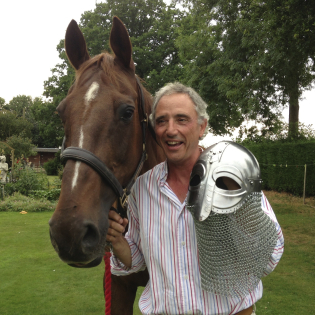 Several reviewers and bloggers have commented on the way Saxon’s Bane touches on the healing power of horses. It isn’t the primary theme of the book, but much of the plot is set in a stables, and the main character Fergus’s growing bond with a horse is a factor in his journey towards wellbeing. In his first encounter with a horse, he finds the touch ‘unexpectedly comforting, like a distant echo of childhood, as if he was once again a hurt infant who had found a soothing presence that was large and gentle and warm. […] the horse lifted its head and touched its muzzle into the angle of Fergus’s neck, holding it there so that the warmth of its breath brushed over his skin. A strange sense of harmony started to fill Fergus’s mind at this unquestioning animal contact. It made him feel naked, with the essence of his being visible to the animal. Not judged, simply known, and accepted.’
Several reviewers and bloggers have commented on the way Saxon’s Bane touches on the healing power of horses. It isn’t the primary theme of the book, but much of the plot is set in a stables, and the main character Fergus’s growing bond with a horse is a factor in his journey towards wellbeing. In his first encounter with a horse, he finds the touch ‘unexpectedly comforting, like a distant echo of childhood, as if he was once again a hurt infant who had found a soothing presence that was large and gentle and warm. […] the horse lifted its head and touched its muzzle into the angle of Fergus’s neck, holding it there so that the warmth of its breath brushed over his skin. A strange sense of harmony started to fill Fergus’s mind at this unquestioning animal contact. It made him feel naked, with the essence of his being visible to the animal. Not judged, simply known, and accepted.’
I have not, in the years that I’ve been riding, been in the same need of healing as Fergus, but I have seen the transformative power that horses can have on damaged people, at both an emotional and physical level. What better excuse to write a friend into the story?
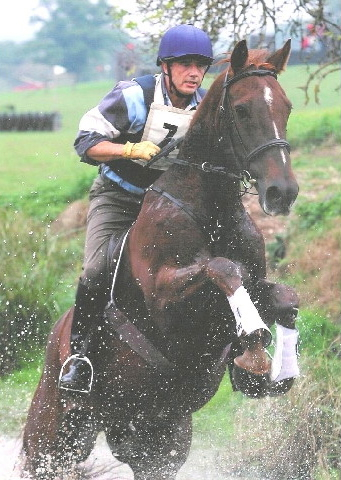 So let me introduce Bally, or Ballycormac Boy to give him his full name, who’s a 17.1 hands Irish Hunter that I bought in Ireland in 2005. He now belongs to a very good friend and his wife, who are kind enough to let me ride him regularly. We even compete from time to time, at a very local, amateur level.
So let me introduce Bally, or Ballycormac Boy to give him his full name, who’s a 17.1 hands Irish Hunter that I bought in Ireland in 2005. He now belongs to a very good friend and his wife, who are kind enough to let me ride him regularly. We even compete from time to time, at a very local, amateur level.
Bally now lives on the edge of Hodgemoor Woods in Buckinghamshire. The Hodgemoor Riding Association (HRA) works in partnership with the Forestry Commission, raising funds from members to maintain the woodland tracks for all users. A local retailer is co-operating with HRA to offer signed copies of Saxon’s Bane at £6.99, including UK postage, of which £1.00 will be donated to Hodgemoor Riding Association.
If you’d like to take advantage of this offer, click on the small horse’s head image below (yes, that’s Bally!) and you’ll be redirected to the relevant page on the HRA site.
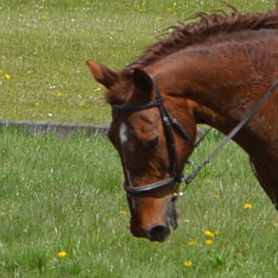
HRA
Filed under: Musings, News Tagged: books, british horror, debut novel, horses, paranormal, publication, publishing, riding, Saxon, Saxon's Bane, solaris books

September 12, 2013
Interview posted on YouTube
Today is the UK release date for Saxon’s Bane. To mark the occasion, Jonathan Oliver of Solaris sat me in front of a video camera and asked me loads of questions, ranging from my thoughts on genre, to the background to key characters in the book, and my writing journey. We even touched on the healing power of horses! The interview has been posted on YouTube at:
Filed under: News, One writer's journey Tagged: books, debut novel, Genre, launch, literature, paranormal, publication, Saxon, Saxon's Bane, solaris books, writing

September 6, 2013
Saxon’s Bane launched!
A wonderful crowd of friends and family swelled the shoppers at The Forbidden Planet in Shaftesbury Avenue, London, on Wednesday night, for the launch of Saxon’s Bane.
My agent Ian Drury of Sheil Land Associates kindly kicked off the proceedings before I was persuaded to read the first chapter.  A Q&A followed, in which the questions were mercifully uncontroversial but lively enough to swell the numbers queuing to buy the book.
A Q&A followed, in which the questions were mercifully uncontroversial but lively enough to swell the numbers queuing to buy the book.
I’d found a very suitable wine,  so perhaps it was inevitable that a little frivolity would creep into the occasion, in which a Saxon replica helmet (gratifyingly close to the book’s cover image) featured heavily!
so perhaps it was inevitable that a little frivolity would creep into the occasion, in which a Saxon replica helmet (gratifyingly close to the book’s cover image) featured heavily! 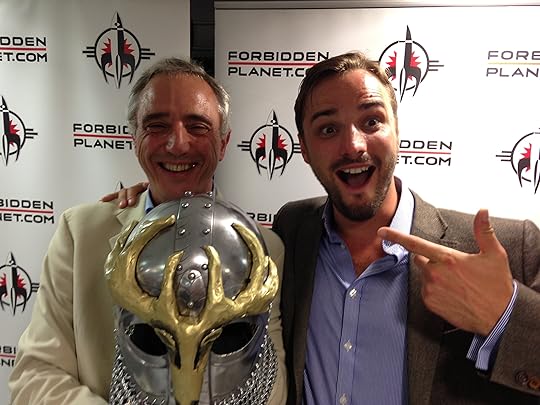
I was humbled by the number of friends who came along in support, some of whom had traveled a long way to be there. The Forbidden Planet team were stunned that I was still signing books when they were  preparing to close the shop, which I gather is almost unknown for a debut launch.
preparing to close the shop, which I gather is almost unknown for a debut launch.
It was great to share a glass with friends and the guys from Solaris afterwards in De Hems. A great evening, with brilliant company.
Filed under: News, One writer's journey Tagged: books, debut novel, launch, literature, paranormal, publication, Saxon, Saxon's Bane, writing

August 30, 2013
Saxon's Bane sample chapters
http://www.goodreads.com/book/show/16...
Enjoy!










